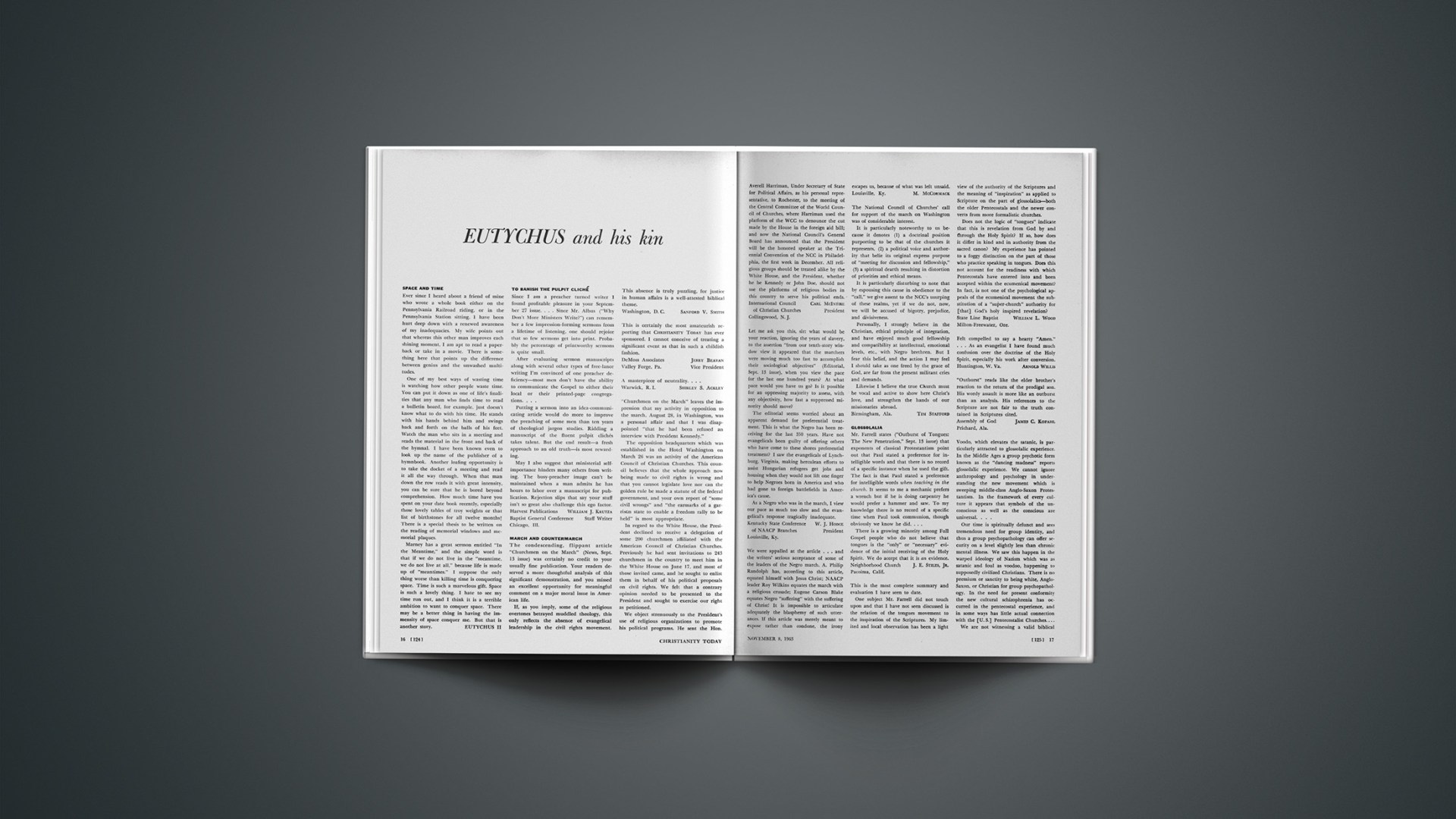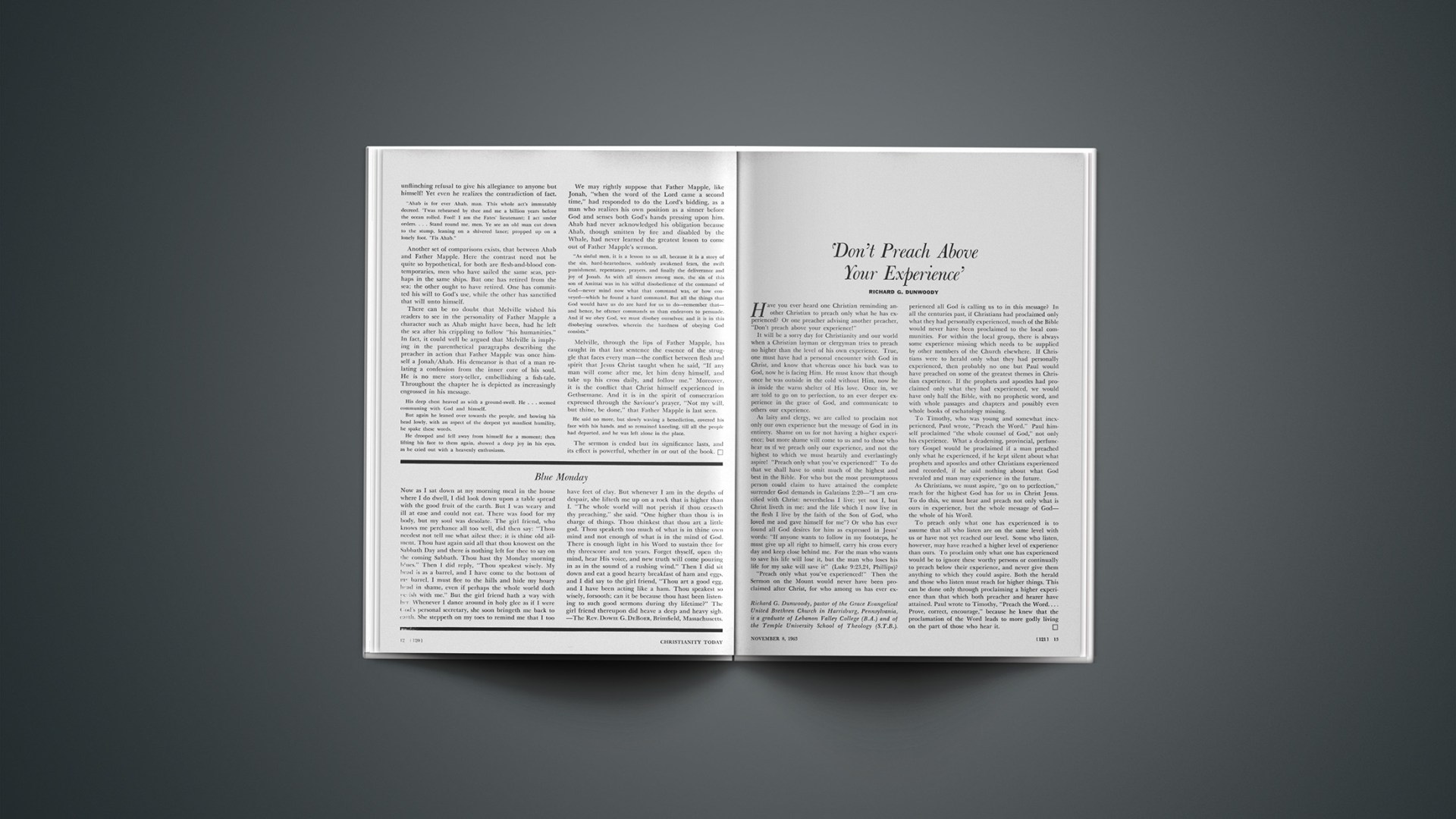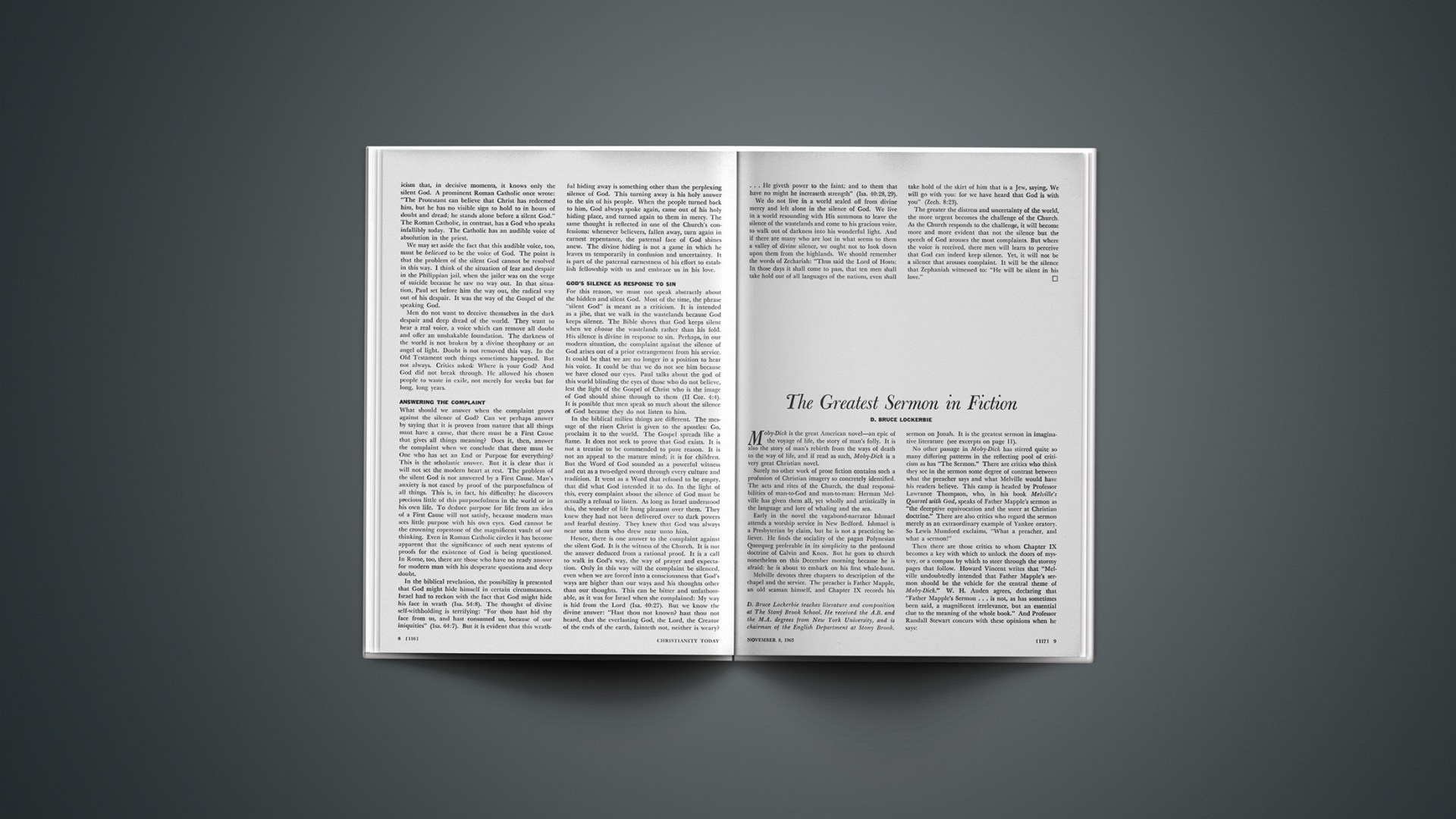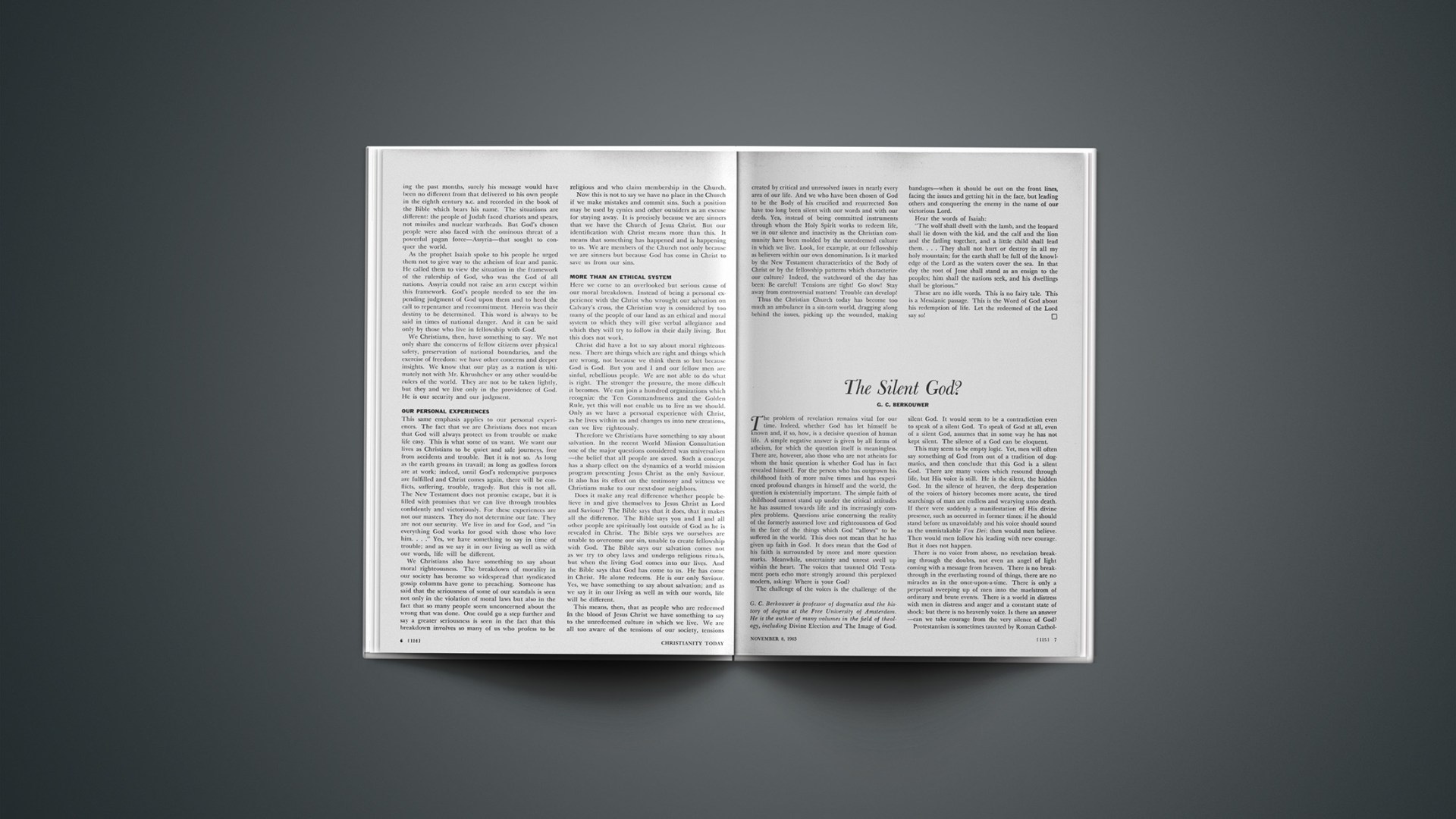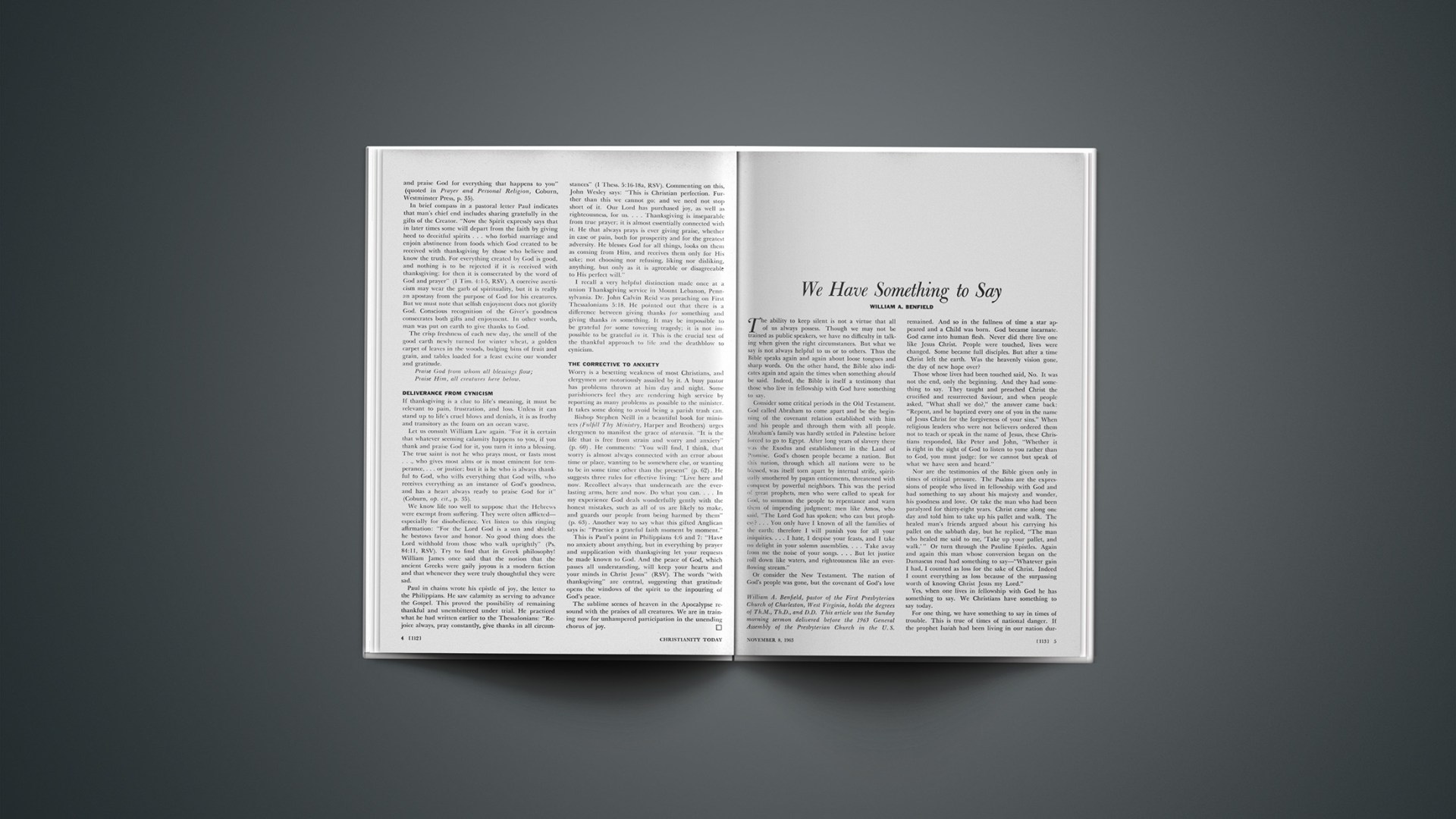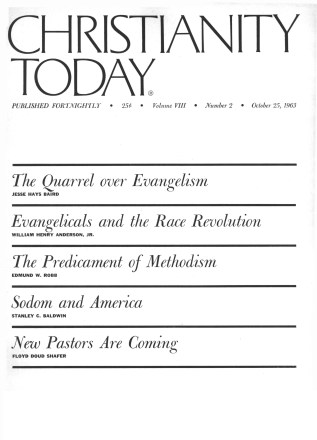Since Celsus of the second century, a recurring criticism of Christianity has been that it is too narrowminded to listen to the voices around it. Without doubt a prima-facie case can be established. Tertullian of North Africa raised the question, “What has Jerusalem to do with Athens?” The medieval Church was as brusque in its reaction to the new thought forms arising from the rediscovery of the writings of Aristotle. In the nineteenth century some Christians violently opposed the use of chloroform in childbirth.
But the truth is that the Church has not been unwilling to listen to voices around it; she has only been slow to do so. That is why critics have been able to make the bigoted characterization stick, for the Church has been one of the great conservative forces in Western life. Novelists of the 1920s such as Sinclair Lewis, and the philosophers Friedrich Nietzsche and Jean Paul Sartre attacked the Church. But the Church listened even to their views. She only appeared not to, because she failed to respond quickly.
The Church has sometimes fooled both herself and her detractors by insisting that her ear is attuned only to the voice of her Lord. On the contrary, she has sometimes resembled those referred to in Second Timothy “who will listen to anybody and can never arrive at a knowledge of the truth.” She has even been like a King Jehoiakim, putting a penknife to the document to which she claims to listen, while in fact listening to voices from elsewhere.
By the time a new intellectual movement reaches its peak it begins to infiltrate the Church—or the Church, in an attempt to oppose the new philosophy, accepts its premises. The difficulty is that about the time the Church accommodates to the current fad new intellectual currents arise, rendering the adjusted views obsolete. But the Church for at least another generation feels obligated to defend the fad along with the faith, and is therefore more bigoted than she ought to be.
In our time, effort is being expended in the Church to eradicate narrowmindedness, and this has something to commend it. But there is cause for concern, because that effort has been directed not only against thought molds of obsolete philosophical systems, but against the biblical faith itself. The result has been that in becoming openminded the Church has become innocuous so far as her real message is concerned. There is a great need in our time that the Church discover her own voice, so that she will know how to react to other voices.
This charge against Christianity is a serious one. What evidence is there to support it?
First, we might point to Augustine, whose reading of Neo-Platonic philosophy paved the way for his conversion. Even after becoming a Christian, he found Neo-Platonism compatible. In Against the Academics, he wrote: “I feel sure at the moment that I shall find truth with the Platonists, nor will it be at variance with our sacred mysteries.” Augustine, therefore, listened not only to his Lord but also to the voice of Plato.
Scholars today are not so certain that Neo-Platonism and the Scriptures say the same thing. In fact, it is popular in some circles to make a radical distinction between Greek and Hebrew ways of thinking. But the fourth-century Church heard the certain voices that were incorporated into the life and thought of Christendom.
In the thirteenth century, the voice heard by the Church was that of Aristotle, but not until the tenacity of Augustinian thought molds had relaxed. In the twelfth century, the works of Aristotle were rediscovered, and Thomas Aquinas, now the official theologian of a major segment of Christendom, prepared his monumental synthesis, but not without opposition. The medieval Church opposed but then accepted Aristotelianism, and its influence continues in the theology of Christendom even to this day.
As Protestants we tend to think, “It is true, Christianity did listen to other voices, but all that was remedied by the Reformation.” But many remnants remain. Plato’s proofs for the immortality of the soul may still be heard; but as contemporary biblical scholars tell us, the early Christians affirmed not the immortality of the soul but the resurrection of man in bodily form. Also Aquinas’ five arguments for the existence of God, three of which he borrowed explicitly from Aristotle, have had a continuing place in Protestant apologetics. But most theologians in our day agree that these arguments are not Christian after all, because they prove a god who is an object, an “It,” rather than the God of Abraham, Isaac, and Jacob, who must be addressed as “Thou.”
Of greater significance to the contemporary scene is the battle which the Church has fought with modern science. At first the Church clung to such views as the earth being the center of the universe and matter consisting of four elements. But a later generation of churchmen decided that these views were not necessary to the faith. By this time, however, science had moved even further. The sun was now the center not of the universe but only of the solar system, and the number of elements kept multiplying. Many Christian thinkers have now rightly concluded that it is not the business of the Church to make pronouncements in science.
Even now, however, the Church is characterized as seeing red when the word science is mentioned, but the truth is that she has listened avidly to the voice of science. Henry Wieman, professor emeritus of the University of Chicago Divinity School, even went so far as to employ the scientific method in constructing a Christian (?) theology.
These examples of the influence of the ongoing intellectual life of man upon Christianity are selective rather than exhaustive; yet they are sufficient to show that, contrary to the usual opinion and often to her own chagrin, the Church, however slowly, has tended to listen to most of the voices around her. As Basil Willey of Cambridge University has written:
Nothing more clearly illustrates the impingements of secular thought upon Christianity than the history of the successive changes in the mode of arguing the case for the Christian religion. Each change has the aspect of a phase in a rear-guard action; driven from one position after another, religion seeks to entrench itself in surer and surer ground. If religion has been thus largely on the defensive it is because religion long occupied territory not properly its own; as Arnold put it: “Religion has attached its emotion to certain supposed facts, and now the facts are failing it” (Christianity Past and Present, p. 11).
Willey goes on to say that now, due to our increased knowledge of history and the fact that the faith has been laid bare to its very foundation, we are in a better position than ever before to determine what is uniquely Christian. But by and large, the Church goes on her way listening more to the voice of her age than the voice of her Lord.
Christians in our time are shockingly unaware of the nature of the biblical faith. The concern of college students from Christian homes is not so much, What is the nature of the faith?, as, Should one believe? Some time ago as a student waited in my office for a conference he read a book. My curiosity was aroused, and when his turn came I asked what he was reading. It turned out to be a book on the philosophical bases of faith. He said that discussions in the dormitory at night revolved about religion and that he was attempting to find the answers to some of the problems raised. Most students are more sophisticated in questioning than in their knowledge of what the faith is all about. A person should be at least as concerned about the content of his faith as he is about whether he should believe. But most students seem much more concerned about the latter. Unfortunately, it is more popular to read books about belief that often take their cues from voices other than Christian, than it is to read the biblical documents or books about the biblical faith.
One does not need to be an astute observer to conclude that the Church is having too little impact on the intellectual climate of our time. Part of the reason may be that the Church is no longer clear about what her message ought to be. Furthermore, she has taken so seriously her obligation to listen to anyone that she no longer feels that anyone should listen to her.
Last spring we invited my advisees into our home for the evening. Among those present was a pre-ministerial student who told of plans to transfer to a Bible college, and the subject turned to religion. Represented in the group were some from various groups in Christianity and Judaism. What was significant and is germane to this article is that, except for the pre-ministerial student, each soon conceded any uniqueness or finality of the Christian or Jewish faiths. These students seemed as committed to listening to anyone as to the biblical faith. Our generation includes very many who will listen to anybody and who thus can never arrive at a knowledge of the truth.
The Church is in this predicament precisely because she does not know the voice of her Lord. Even Paul Tillich can write;
Certainly, every real Christian is gripped by the power of the biblical words and even of the classical creedal statements of the Church. They mediate something to him that is more important than logical understanding. And nobody can be a theologian who is not gripped in this way by the Christian message (Religion in Life, Winter 1955–56).
But, as G. Ernest Wright observed, Tillich leaves off where he must begin. Wright’s task is to determine the nature of the biblical faith as reflected in biblical literature. It is also the task of the Church if she is to be the Church of the Lord, for if she spends most of her time listening to other voices, then she is something else.
When the Church has discovered who she is by listening to her Master, then she will find that it is her obligation to speak as well as listen when confronted by the voices of our time. And it is the word and work of her Lord that sit in judgment on all other words and works.
It is not for the Church to listen to anyone but her Lord. It is in this way that she arrives at a knowledge of the truth. He declared, “I am the way, the truth, and the life.” The lesson the Church needs to learn from her own history is that she must more sharply distinguish His voice from the other voices.
Thomas M. Olbricht, assistant professor of speech at The Pennsylvania State University, received the M.A. and the Ph.D. degrees from the University of Iowa and the S.T.B. degree from Harvard Divinity School.



